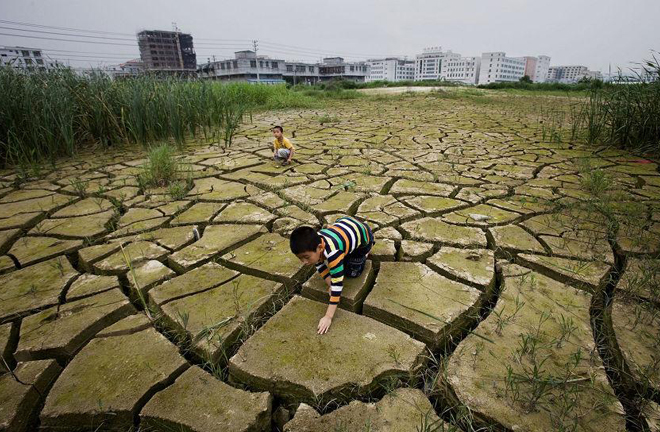Nature mirrors human activity

Children play on deserted farmland.
As a branch of history and an interdisciplinary research field, environmental history is becoming a more popular field of research. This has gained momentum with the establishment of a high-quality postgraduate course entitled “Research Frontiers of World Environmental History,” which was established by Peking University’s Department of History and its World Environmental History Research Center.
During the 1950s and 1960s, environmental problems frequently appeared and became a part of the public’s consciousness. Terms like “ecological crisis” and “environmental crisis” were used to mark the severity of these problems. Environmental history came into being in the era of worldwide cultural reflection and reform.
Mei Xueqin, a professor from the Department of History at Tsinghua University, said that many fresh efforts have been made in regard to environmental history, a new academic discipline in the 21st century, and that one of them is that the researchers are trying hard to construct a historical evaluation scale or standard, which could be summed up as “nature is the mirror.”
The approach is to use natural changes to examine the advantages and disadvantages, gains and losses of human culture and creations, then to use these to judge human production and ways of life and the ideologies contained within them, as well as the influences and results of the actions of specific historical figures, Mei added.
“In an era when people are discussing ecological crises, environmental historians add new perspectives and dimensions, which is undoubtedly a great contribution to modern historical science,” Mei said.
Bao Maohong, a professor from the Department of History at Peking University, said that the study of environmental history has brought new changes to the compilation of world history and that it helped overcome limitations created by such ideas as anthropocentrism and euro-centrism or using nations as basic units, to provide just a few examples, even as it compiles and codifies the laws of nature and human development.
Since entering the new century, the topics and content of environmental historical study have changed with each passing day, and this field of study has not only made a lot of breakthroughs in traditional fields, but also set the stage for some new research fields through an interdisciplinary approach.
Gao Yan is a young scholar who studies China’s environmental history via the US-based university of Memphis. Gao has reflected on the study of China’s environmental history from the perspective of world environmental history, and said that the focus of the overseas study into the contemporary history of China’s environment included the relationship between climate change and human society, and the national development and utilization of environmental resources, as well as the environment and culture.
It also involved research into its effects on societies at the local level, China’s environmental history and the history of the global environment. Key areas and prospects for further developing overseas study into China’s environmental history include topics as diverse as energy history and comparative environmental history.
The study of environmental history has for a long time put a lot of emphasis on the relations between human beings and terrestrial ecosystems, and attached less importance to the ocean.
Nevertheless, in recent years, this has begun to change. Paul Holm, a professor from Trinity College, Dublin, Ireland, contended that studies into the history of the marine environment presented new possibilities for research, with particular potential for research into sexual functions of marine species, the discussion of sustainability issues in history, and examining ways to understand the long-term changes in the marine environment, to name a few. He also said that marine environmental history could help with measures to protect the marine environment, guide people’s consumption and social behavior, and make contributions to marine environmental protection.
The perspective of environmental history has brought new vigor to traditional historiography research in our country. Song Yueqin, a professor from College of Environmental Sciences and Engineering at Peking University, analyzed the reasons why the capitals of the Xia Dynasty (2070-1600 BC), the Shang Dynasty (1600-1046 BC), and the Zhou Dynasty (1046-771 BC) were set in Mount Song and Luoyang, in Henan Province, and prospered.
In his view, the region, located in the Taihang Mountains and ecological transition zone of the Yellow River alluvial plain, with multiple edge effects, has become one of the birthplaces of Chinese civilization. Meanwhile, the advantages in terms of human resources and the area itself will help in the urbanization of the Central Plain again in the future.
Sun Miaoning is a reporter at the Chinese Social Sciences Today.
